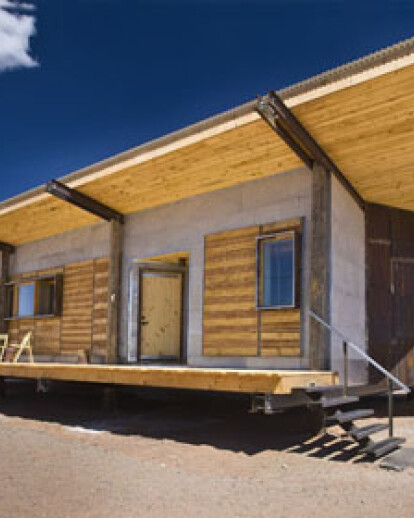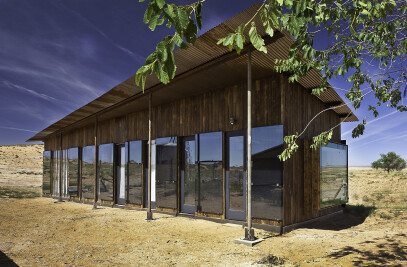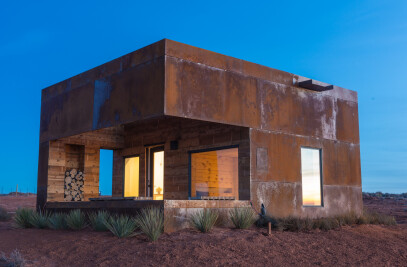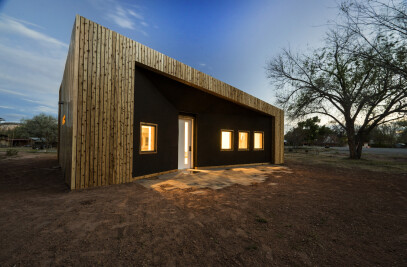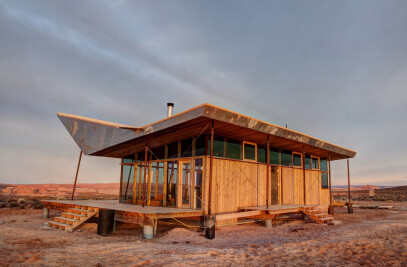“Right sized”, a home less than 1,000 square feet. The most sustainable building resource on the Navajo Reservation is earth. Hence, the idea to build a “rocket stove”, which burns kindling size pieces of wood, provides a heating “stove”atop a 55 gallon barrel in line with the 20 feet of flue which heats a “cob” bench, which in turn thermally heats the home. Moreover, the idea has proven to be the primary heating source for the entire home, nearly rendering unnecessary the in-floor radiant heating, which itself begins with vertically-oriented solar hot water panels that provide the south wall of a shed harboring the hot water reservoirs. So, mere kindling the size of wood shims provide the family of five comfort during the brutally cold high desert winters. Enough “cob” -- clay, sand, straw and water -- was produced purely by heart and hand (and feet boot-crushing tenacious clumps of hand-and-shovel harvested clay) by a three-man team to cover the hand-made compressed earth bricks built up to correctly position all of the hand-made (on-site, student-welded) components -- combustion cylinder, clean-out chambers, lids and insulated handles, the aforementioned drum and interior cylinder leading to the horizontally winding flue. Decidedly low-tech, quasi-vernacular and eminently scalable. There is no HVAC system -- really no mechanical system whatsoever, just the sun and a little bit of wood, and the breeze. The overriding aesthetic intent was inspired by the vernacular pole barn. Additionally, accidentally, there exists a second iconography to the innately cultural hogan on the Navajo Reservation, namely the single-wide trailer, much more architecturally provoking in it’s simplicity and adaptability to the east/west elongated rectangle which provides a longer south-facing aspect for glazing and low-tech, vernacular passive solar orientation. The raised house allows the ubiquitous ‘blow-sand’ to pass beneath it, rather than quickly pile up alongside. Interestingly, the air that flows in the shade beneath the home cools, and it pleasantly refreshes the back deck, an abstracted version of the traditional “shade structure” to which the indigenous peoples move as the seasons switch from high desert brutally cold to high desert brutally hot. Only four feet off the ground it also encourages an inordinately greater amount of natural ventilation. The southern exposure is calculatedly glazed for optimum passive solar heating, exposing the sun’s reach to the above-mentioned in-floor radiantly heated concrete thermal mass. The exterior of the Whitehorse home is raised by recycled telephone poles, clad by recycled sheets of aluminum accented by recycled, discarded and aesthetically reconstituted shipping pallets. Natural plaster completely covers the interior, altering color by naturally mixing different deposits of back-breaking, hand-shoveled 5 gallon buckets of clay. The large singly shed roof is guttered, which slope toward the center on the north side and downspout into a 2,000 gallon buried cistern.
More Projects by DesignBuildBLUFF
Project Spotlight
Product Spotlight
News

Fernanda Canales designs tranquil “House for the Elderly” in Sonora, Mexico
Mexican architecture studio Fernanda Canales has designed a semi-open, circular community center for... More

Australia’s first solar-powered façade completed in Melbourne
Located in Melbourne, 550 Spencer is the first building in Australia to generate its own electricity... More

SPPARC completes restoration of former Victorian-era Army & Navy Cooperative Society warehouse
In the heart of Westminster, London, the London-based architectural studio SPPARC has restored and r... More

Green patination on Kyoto coffee stand is brought about using soy sauce and chemicals
Ryohei Tanaka of Japanese architectural firm G Architects Studio designed a bijou coffee stand in Ky... More

New building in Montreal by MU Architecture tells a tale of two facades
In Montreal, Quebec, Le Petit Laurent is a newly constructed residential and commercial building tha... More

RAMSA completes Georgetown University's McCourt School of Policy, featuring unique installations by Maya Lin
Located on Georgetown University's downtown Capital Campus, the McCourt School of Policy by Robert A... More

MVRDV-designed clubhouse in shipping container supports refugees through the power of sport
MVRDV has designed a modular and multi-functional sports club in a shipping container for Amsterdam-... More

Archello Awards 2025 expands with 'Unbuilt' project awards categories
Archello is excited to introduce a new set of twelve 'Unbuilt' project awards for the Archello Award... More
